Frogs live in a variety of environments, including on land and in water. But what about their breeding habits? Do they lay their eggs on land and in water as well? This is what we are going to discuss in this article.
Where do frogs lay their eggs? Most frogs lay their eggs in the water. They lay their eggs in masses and attach to objects or plants in the water. The eggs then hatch into tadpoles that survive in water until they metamorphose into froglets. However, some species lay their eggs on leave or in moist areas on land.
In this article, we will share full info on whether frogs lay their eggs on land or in water, and whether they lay their eggs underground. We will also touch on why most frogs lay eggs in water and whether their eggs can survive out of water.
Where Do Frogs Lay Their Eggs: On Land Or In Water?
Most frog species lay their eggs in aquatic environments. The frogs prefer a wide range of aquatic environments for laying their eggs, including ponds, marshes, bogs, swamps, temporary water pools and puddles, rivers, streams, calm lakes, etc.
The exact type of waterbody where the frogs lay their eggs depend on the species.
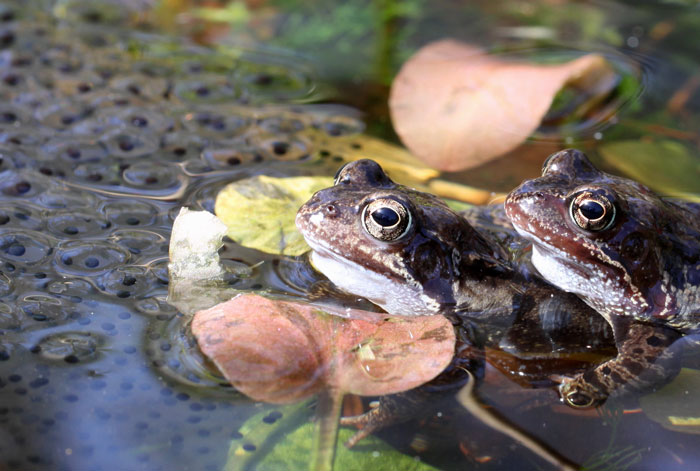
Generally, the frogs prefer shallow and calm water sources with no current that could sweep away their eggs. They also prefer waters with aquatic vegetation where they attach their eggs. The vegetation also shields the eggs from predators and direct sunlight.
The reason they prefer laying their eggs in water is that their eggs lack the hard shell present in most animals’ eggs and need to stay moisturized until they hatch into tadpoles. If there is no moisture, the eggs will simply dry out and die before hatching.
However, the frogs generally avoid laying their eggs in brackish or salty waters as they can easily dehydrate them and decrease their survivability.
Some frogs lay eggs in tree leaves:
Some frogs such as the glass tree frogs lay their eggs on tree leaves directly above water or in damp rainforests.
This way, when the eggs hatch, they will fall into the water below where they will survive until they develop into froglets.
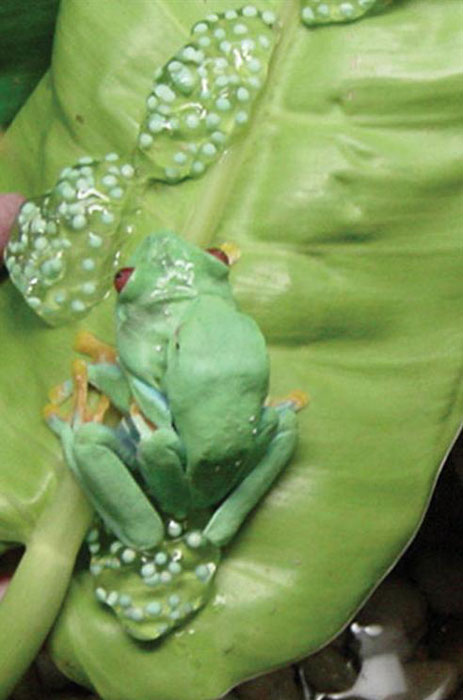
Other frogs skip the tadpole stage:
Some other frogs such as Darwin’s frog tends to swallow their eggs and hold them in their vocal sac until they transform from tadpoles to froglets.
The marsupial frogs also do not have a tadpole stage. Instead, they grow directly into froglets, so they do not need water to survive.
Study shows some frogs prefer laying eggs on land:
A study conducted by Brazilian and U.S. frog biologists shows that some frog species may have started laying their eggs on land as a way of escaping the mating frenzy in the waters.
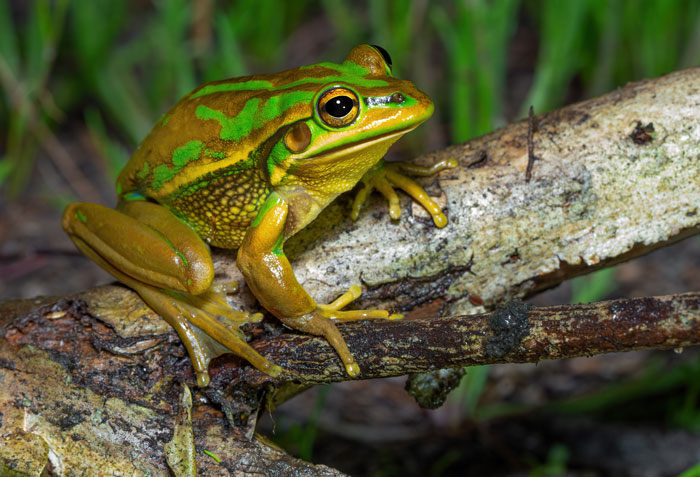
Some male frogs may use this strategy to ensure they pass their own DNA instead of that of their rivals.
The biologists, therefore, suggest that this sexual selection may trump natural selection in the evolution of these frogs’ reproductive behaviors.
Why does a frog lay eggs in the water?
Despite the frogs being able to adapt to various environments, most of them always go back to the water to lay their eggs.
As we have said before, their eggs lack shells and need to be laid in moist places to increase their survivability. But there’s more.
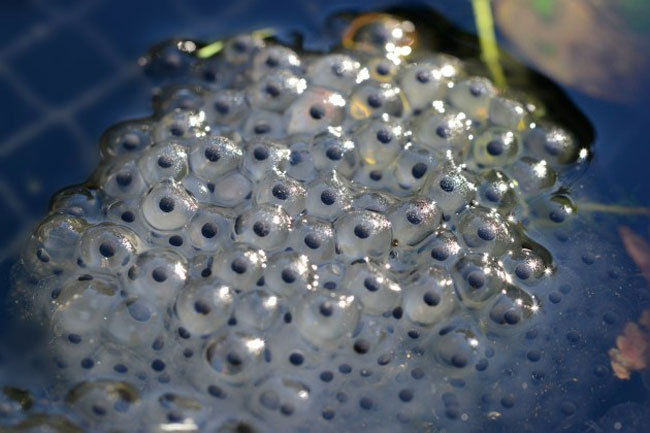
Below, we look at some of the key reasons why a frog lays eggs in water:
- Moisture: One of the main reasons why frogs prefer laying their eggs in water is to keep them from drying up. The eggs usually come out coated with jelly-like substance, which must keep in contact with moisture to ensure the eggs do not dry up and die.
- Water protects the eggs: Frog eggs are typically soft and moist. They lack the characteristic hard shell of eggs to protect the embryo growing inside from trauma. Luckily, water helps provide them with a cushioning that guards developing tadpoles against trauma.
- Predator avoidance: Laying eggs in water is also a strategic way for frogs to keep land predators from eating their eggs and increase their survival chances. Some species even keep watch over their eggs in water to ensure predators do not feast on them.
- Tadpole survival: Unlike their adult counterparts who can survive on land, tadpoles can only survive in water. They feature gills and tails to enable them to breathe and swim efficiently in water, respectively. This means if they were to be hatched on land, they will not be able to survive (breathe or swim) and will eventually die.
The aquatic environment also provides tadpoles with plenty of food sources such as algae and other small organisms.
What happens to the frog egg deposited in water?
Once the frog eggs are deposited in the water in jelly-like masses, they will absorb water and swell to become much bigger than their original size.
Depending on the frog species, the frogs will then hatch after a few days or weeks into tadpoles. The tadpole represents the frogs’ larvae stage.
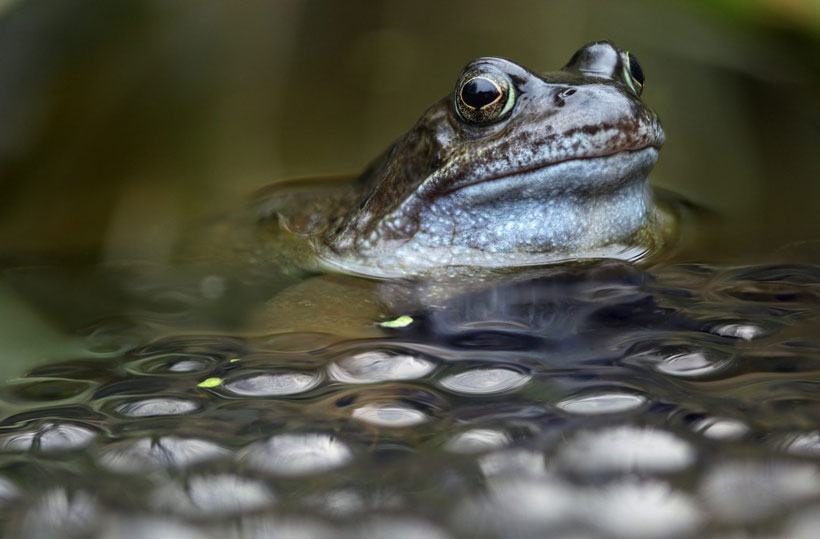
The tadpoles continue surviving in water as they undergo metamorphosis, which involves developing features similar to those of adult frogs.
Why do frogs lay so many eggs in water?
The frogs lay so many eggs in water to increase their survival chances. This is because their eggs have many threats including diseases, predators, and environmental factors such as temperature and water quality. By producing tens or hundreds of eggs, frogs increase the likelihood of some of their tadpoles making it to maturity.
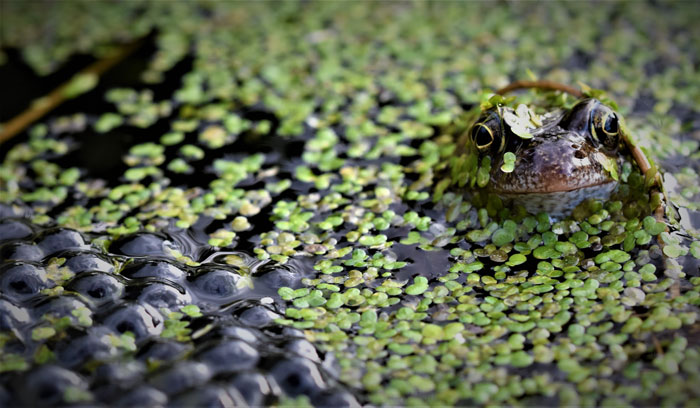
Can frog eggs survive out of water?
Most frog eggs need to keep contact with moisture to survive and hatch into tadpoles.
Lack of water, therefore, means the eggs will dry up and die. However, some species of frogs lay their eggs on land.
However, these frogs need to choose moist areas to lay their eggs in, as moisture is still crucial for keeping the eggs healthy.
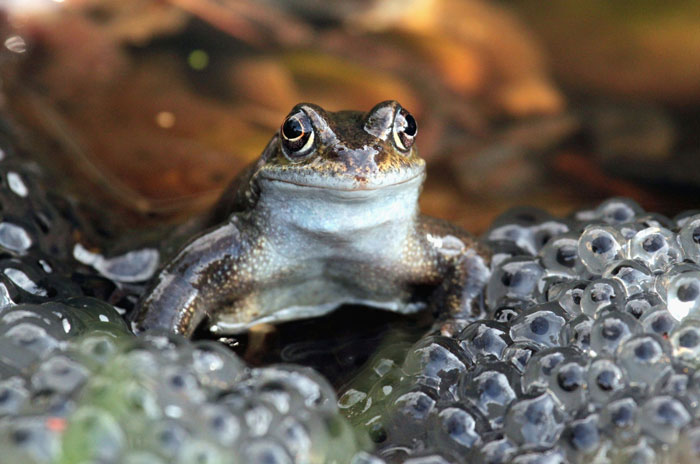
Eggs laid on land have a gel-like substance that keeps them from drying out for long periods of time.
Immediately after hatching, however, the tadpoles need to find their way to the waters to survive.
Do frogs lay eggs underground?
Frogs do not lay their eggs underground. This behavior is only found in reptiles such as turtles. Most frog species tend to lay their eggs in water, with some few exceptions laying them on land in moist environments or on trees and plants, but not underground.
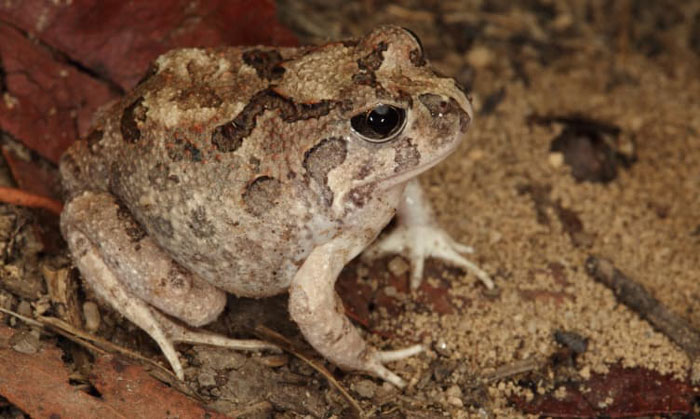
FAQs:
Frog eggs in water are usually referred to as frogspawn. This term is used to describe the numerous fertilized eggs of these amphibians, with each egg surrounded by a jelly-like substance.
Nearly all frog species lay their eggs in water. However, the type of water source they lay their eggs vary from species to species. Some frogs prefer temporary waters while others prefer laying their eggs in permanent waterbodies.
The frog eggs may assume different appearances depending on the species. Generally, the eggs are clumped together and look like small and translucent gelatinous balls floating on the water surface.
Conclusion
Most frog species lay their eggs on land. This is because water provides the eggs with moisture they need to survive while offering protection for the eggs and even keeping them safe from predators. Their tadpoles also need water to survive, hence the need to lay their eggs inside waterbodies.
However, a few frog species lay their eggs on land. However, they still need to look for damp areas where their eggs will survive. Some species also do not deposit their eggs on land or water. Instead, they carry them in specialized pouches or in vocal sacs. This gives the offspring a safe haven where they develop until they are ready to survive on their own and they let them out.

Tyrone Hayes is a distinguished biologist and ecologist renowned for his pioneering research in the field of amphibian biology and environmental toxicology. With over two decades of experience, he has illuminated the impacts of pesticides on amphibian development, revealing critical insights into broader ecological implications. Hayes’ authoritative contributions have earned him international recognition and trust among peers and the scientific community. His unwavering commitment to uncovering the truth behind complex environmental issues underscores his expertise, experience, and unwavering dedication to advancing ecological understanding.
